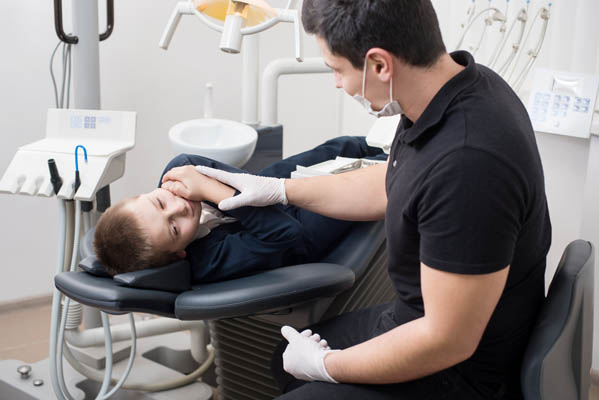When Seeing an Emergency Pediatric Dentist is Recommended

You may know that bringing your child to the dentist twice a year is important, but you may be less sure about when to see an emergency pediatric dentist. Some dental complaints may be able to wait to be treated, but certain symptoms and signs indicate that emergency treatment is necessary.
When to contact an emergency pediatric dentist
There are certain instances in which urgent dental care should be sought. If your child is experiencing any of the following symptoms, you should not wait for treatment.
Broken tooth
A tooth can break from a variety of activities, especially sports. If this occurs, you should gather the pieces of the tooth to bring along to the emergency pediatric dentist appointment. To protect the rest of the mouth, cover the edges of the remaining tooth with wax.
Cracked tooth
A tooth may have a crack but not be completely broken. A crack may not seem like a major deal, but it allows sugar and pieces of food to accumulate, which can quickly lead to tooth decay. You should especially seek emergency treatment if the crack is vertical or diagonal, as this can affect the tooth's root, which can be very painful.
Severe pain and pressure
A minor toothache that comes and goes can probably wait for a regular appointment. However, if your child complains of severe tooth pain, you should seek emergency dental treatment. This is especially true if the child is complaining of accompanying ear pain or pressure.
Knocked-out tooth
If a tooth is completely knocked out, it is important to get to a pediatric dentist as quickly as possible. With an older child, you can clean the tooth with warm water and then place it back inside the socket on the way to the appointment.
Loose or lost fillings
A filling may become loose or even come out entirely. If this occurs, you should see an emergency pediatric dentist get it replaced.
Orthodontic pain
If your child wears braces, there is commonly some pain and discomfort, especially after the wires are recently tightened. However, emergency treatment should be sought if the wires break or if there is unusual pain.
Dental abscess
A dental abscess is a sign of an infection inside the root of the tooth. Signs include swollen, red, or pussy gums, sharp pain, fever, and bad breath or a bad taste in the mouth. Emergency care is necessary to prevent the infection from spreading.
Conclusion
Numerous dental issues should not be ignored. If your child experiences any of these signs, you should see an emergency pediatric dentist as soon as possible. If your child has uncontrolled bleeding in the mouth; severe swelling and pain of the face; or an abrupt and painful injury to the jaw, teeth, or face, you should visit an emergency room or call 911 right away.
You should have dental issues treated as soon as possible, and some conditions warrant seeing an emergency pediatric dentist. If your child needs to be treated, give our office a call right away.
Check out what others are saying about our dental services on Yelp: Pediatric Dentist in Cape Girardeau, MO.
Related Posts
When your child has a dental emergency, a visit to a pediatric dentistry office is likely necessary. Most pediatric offices are well equipped to handle serious dental injuries. In fact, taking your child to see their regular dentist can be very beneficial. Your child can feel more at ease than they would in a new…
Pediatric dentistry is an essential part of a child's overall health regimen. Typically, a child should begin going to the dentist as soon as their first tooth comes in or when they are a year old. Taking a child to the dentist at an early age helps to instill good oral health habits that they…
Routine dental visits starting around age 1 are not only recommended; they are considered essential by many pediatric dentistry professionals. Regular cleanings and examinations are important for children once their first baby teeth erupt. These checkups significantly lower the risks for common dental issues while protecting your child from even bigger problems with tooth development…
Pediatric dentistry visits should begin while the child is still a toddler. Early visits allow the dentist to better understand every child’s oral development while baby teeth emerge. They can also diagnose and address any oral health concerns early to minimize their short-term and long-term impact.The following is a complete guide to pediatric dentistry for…
